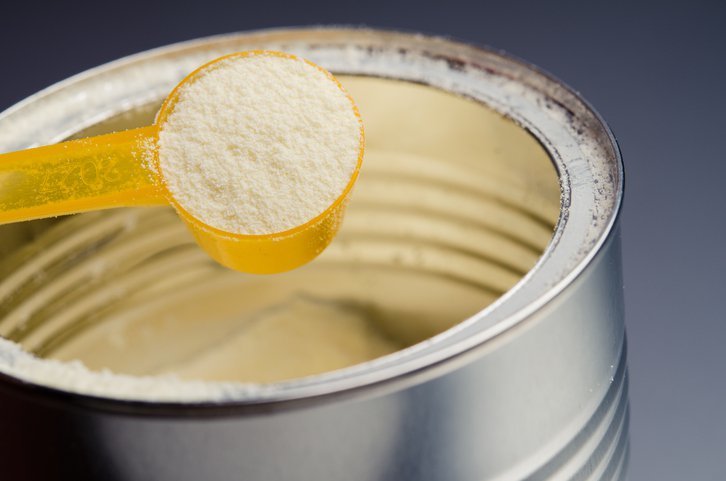Contents:
- Medical Video: Breastfeeding Intake Assessment - Part 1, How to know if a baby is drinking enough milk.
- Various types of formula milk
- Formula milk from cow's milk
- Formula milk from soy milk
- Lactose-free formula milk
- Formula milk for partial hydrolyzate or hypoallergenic milk (HA)
- Select which one?
- See the nutritional content of formula milk
- Iron
- Probiotics and prebiotics
- DHA and ARA
- What needs to be remembered
- How do I know that I have chosen the right formula?
Medical Video: Breastfeeding Intake Assessment - Part 1, How to know if a baby is drinking enough milk.
Formula milk can be one of your children's foods after breastfeeding. Or, it might be the only choice when you can't give milk to your child. Choosing formula milk is not difficult and also not easy. However, wrong-wrong, your child can show an allergic reaction to certain formula milk. Therefore, it is necessary to choose the right formula for your child.
Various types of formula milk
There are many types of formula milk from various sources, forms and various brands. Several types of formula milk are available, namely:
Formula milk from cow's milk
Most formula milk comes from cow's milk. Usually this formula contains protein, carbohydrates and fat in the right balance. The protein in formula milk has changed so that it makes it easier to digest. Unlike ordinary cow's milk which contains protein which is more difficult for babies to digest.
Formula milk from soy milk
This type of formula milk is made from soy milk. Usually, babies need this type of formula if the baby has temporary lactose intolerance due to gastrointestinal infections, cow's milk allergy associated with immunoglobulin E (IgE), galactosemia, and congenital lactase deficiency.
Lactose-free formula milk
This formula does not contain lactose (a sugar contained in milk). So, sugar in formula milk is usually replaced with other types of sugar, such as corn syrup. This type of formula milk is suitable for children who have lactose intolerance or in children who are unable to digest lactose.
Formula milk for partial hydrolyzate or hypoallergenic milk (HA)
This formula contains protein which has been broken down into smaller (hydrolyzed) forms so that it is more easily digested by the baby. Generally, babies who need this type of formula milk are babies who have milk protein allergy or who have problems absorbing nutrients (usually premature babies).
Select which one?
If your child does not have allergies or does not have problems digesting milk, you can give formula milk made from cow's milk. However, if your child has lactose intolerance or is allergic to milk protein, you are better advised to give lactose-free formula, soy formula, or hydrolyzate formula for your child.
See the nutritional content of formula milk
In choosing formula milk, you should not be careless. Choose formula milk that contains good nutrition for your child. Some of the ingredients of formula milk that benefit your child are:
Iron
Iron is needed by your child, especially for babies over the age of 6 years. At this time, the iron reserves in the baby's body have begun to decrease, especially in infants who are not breastfed.
In addition to supporting growth, adequate iron levels in the child's body are also useful to prevent children from anemia. The American Academy of Pediatrics recommends that all babies who are not breastfed get iron-fortified formula until at least 1 year of age.
Probiotics and prebiotics
Some formula milk contains probiotics and prebiotics, which are bacteria that are good for children's intestines. Probiotics and prebiotics in formula milk can provide bacteria that are as good as bacteria in breast-fed children, so this is also beneficial for maintaining the health of the child's intestines.
DHA and ARA
A lot of formula milk has been enriched with these two ingredients. Both are omega-3 fatty acids which are also found in breast milk and certain foods, such as fish and eggs. Several studies have shown that docosahexanoic acid (DHA) and arachidonic acid (ARA) in formula milk can help the vision and development of a child's brain.
What needs to be remembered
In general, formula milk contains a variety of nutrients that are almost the same despite different brands. Whatever formula you choose for your child, make sure you check the expiration date on the packaging. Make sure the product has not passed the expiration date and is far from the expiration date. Make sure too product packaging is not damaged. Damaged packaging can affect the quality of formula milk.
How do I know that I have chosen the right formula?
If your child shows signs, such as:
- diarrhea
- more fussy
- gag
- weak or tired quickly
maybe your child doesn't match the formula you give. However, these signs may also not be related to infant formula. Preferably, consult a doctor immediately if your child shows signs as above. Don't forget to ask your doctor whether you need to replace children's formula.
READ ALSO
- Which Can Happen To Babies After Switching From Breast Milk To Formula Milk
- Comparing breast milk vs formula milk
- Be Careful, Drinking Milk While Sleeping Apparently Harms Babies












